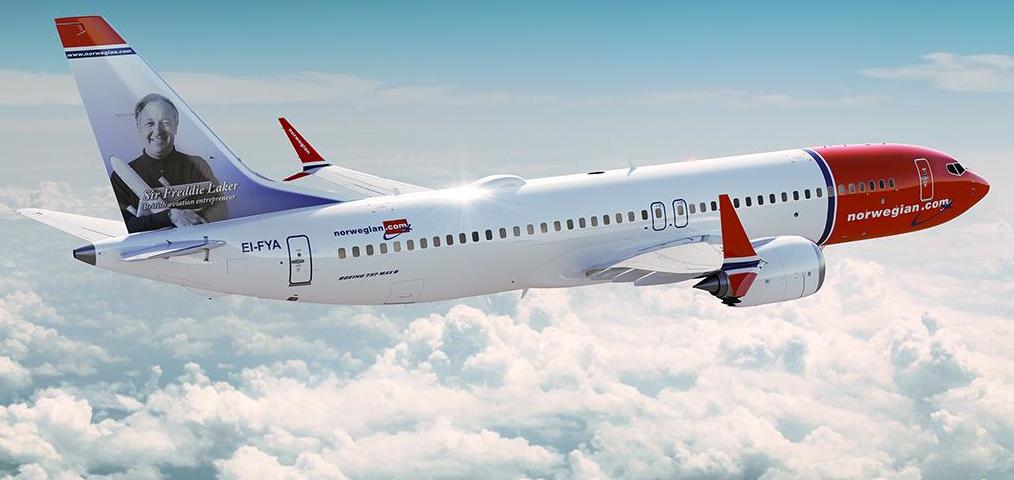This website uses cookies so that we can provide you with the best user experience possible. Cookie information is stored in your browser and performs functions such as recognising you when you return to our website and helping our team to understand which sections of the website you find most interesting and useful.

The troubled budget airline, Norwegian, has reported another year of losses – blaming the worldwide grounding of the Boeing 737 Max after two fatal crashes, and issues with Rolls Royce engines fitted to its Boeing 787 aircraft.
Norwegian has a large base at Gatwick, where it is the third-largest airline behind easyJet and British Airways. It also flies out of Edinburgh and Manchester.
During 2019 Norwegian made a loss of NOK1.61bn (£134m) and carried 36 million passengers – a loss per person of around £3.70.
In contrast, easyJet made a profit of £4.50 per passenger in its most recent full financial year.
Norwegian said: “Year on year, unit revenue increased in nine consecutive months, driven by maturing routes and the optimisation of Norwegian’s global route network.
Created with Sketch.
Created with Sketch.
1/10 1. Air Zealand
The Kiwi flag carrier claimed the top spot in the AirlineRatings.com Airline Excellence Awards due to inflight innovations, environmental leadership and staff motivation
Air New Zealand
2/10 2. Singapore Airlines
Singapore Airlines came second overall and also took the Best First Class award for its Suites product
Getty
3/10 3. All Nippon Airways
All Nippon Airways claimed third place, hailed for being at the forefront of cabin innovation
Getty Images
4/10 4. Qantas
Qantas won two awards - Best Domestic Airline Service and Best Lounges - alongside fourth place
Qantas
5/10 5. Cathay Pacific
Cathay Pacific was named the best long-haul airline in Asia
Getty Images
6/10 6. Emirates
Best Inflight Entertainment was awarded to Emirates
AP/Adam Schreck
7/10 7. Virgin Atlantic
Virgin Atlantic came in seventh
Virgin Atlantic
8/10 8. EVA Air
Taiwan's EVA Air was eighth
Getty
9/10 9. Qatar Airways
The Best Catering and Best Business Class awards went to Qatar Airways thanks to its Qsuites
Getty
10/10 10. Virgin Australia
Virgin Australia won Best Economy for an “extremely spacious cabin that sets it apart from many airlines”, plus Best Cabin Crew
Getty Images
1/10 1. Air Zealand
The Kiwi flag carrier claimed the top spot in the AirlineRatings.com Airline Excellence Awards due to inflight innovations, environmental leadership and staff motivation
Air New Zealand
2/10 2. Singapore Airlines
Singapore Airlines came second overall and also took the Best First Class award for its Suites product
Getty
3/10 3. All Nippon Airways
All Nippon Airways claimed third place, hailed for being at the forefront of cabin innovation
Getty Images
4/10 4. Qantas
Qantas won two awards - Best Domestic Airline Service and Best Lounges - alongside fourth place
Qantas
5/10 5. Cathay Pacific
Cathay Pacific was named the best long-haul airline in Asia
Getty Images
6/10 6. Emirates
Best Inflight Entertainment was awarded to Emirates
AP/Adam Schreck
7/10 7. Virgin Atlantic
Virgin Atlantic came in seventh
Virgin Atlantic
8/10 8. EVA Air
Taiwan's EVA Air was eighth
Getty
9/10 9. Qatar Airways
The Best Catering and Best Business Class awards went to Qatar Airways thanks to its Qsuites
Getty
10/10 10. Virgin Australia
Virgin Australia won Best Economy for an “extremely spacious cabin that sets it apart from many airlines”, plus Best Cabin Crew
Getty Images
“Figures were negatively impacted by the global grounding of the Boeing 737 Max aircraft and ongoing Rolls-Royce engine issues.”
The airline has 18 Boeing 737 Max aircraft. It expects to return them to service in September 2020.
Meanwhile it has been chartering in additional planes to cover for the narrow-bodied 737 and for several long-haul 787s that are grounded because of engine maintenance issues.
It is not clear how much compensation Norwegian has received from Boeing or Rolls-Royce.
Bjorn Kjos, founder and chief executive of Norwegian, stepped down in July 2019. Earlier in the year IAG – parent company of British Airways – withdrew a £1bn bid for Norwegian, which Mr Kjos regarded as undervaluing the airline.
Geir Karlsen, the chief financial officer, said: “2019 marked a new flight path for Norwegian as the company changed its strategic focus from growth to profitability.”
“Throughout 2020, we will turn challenges into opportunities.”
Norwegian says it is expecting to cut about one-seventh of its flights in 2020. It has not said which routes will be affected.



 Africana55 Radio
Africana55 Radio 

